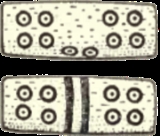
Handgame
Encyclopedia
Handgame, also known as stickgame, is a Native American
guessing game
.
 Stickgame is played with two pairs of 'bones', each pair consisting of one plain and one striped bone. Typically ten sticks are used as counters. The teams agree beforehand which bones they will be guessing - the plain bone or the striped bone. California Indians generally call for the striped bone, whereas most other tribes prefer to guess for the plain bone.
Stickgame is played with two pairs of 'bones', each pair consisting of one plain and one striped bone. Typically ten sticks are used as counters. The teams agree beforehand which bones they will be guessing - the plain bone or the striped bone. California Indians generally call for the striped bone, whereas most other tribes prefer to guess for the plain bone.
The two teams, one "hiding" and one "guessing," sit opposite one another; two members of the "hiding" team take a pair of bones and hide them, one in each hand, while the team sings, drums, and attempts to distract the "guessing" team. The leader or 'Captain' of the "guessing" team, or a team member selected by the Captain, then must guess the pattern of the hidden bones. Since each hider holds one plain and one striped bone in each hand, there are initially four possibilities: both to the left, both to the right, both inside, or both outside. A gesture with a stick or hand generally accompanies each call. For each hider mis-guessed, the calling team must turn over one stick to the hiders. If a hider is guessed s/he must surrender the guessed bones to the calling side. The side continues hiding and singing until both pairs of bones have been guessed and surrendered. Then the teams reverse roles, and the game continues in this manner until one team holds all the sticks.
s, tribal celebrations, and more recently in tournaments sponsored by Indian casinos. More recent versions of handgame played by tribes in the Northwest added an extra stick, or "kickstick"; this variation was promulgated by the Paiute medicine man
Wovoka
when he traveled to the Northwest to teach the Ghost Dance
. Handgame bones and counting sticks have been identified in ancient anthropological digs. Handgame continues to spread amongst Native American tribes; the Indian Gaming Regulatory Act
classified it as Class I gaming, leaving its regulation to individual tribes.
Indigenous peoples of the Americas
The indigenous peoples of the Americas are the pre-Columbian inhabitants of North and South America, their descendants and other ethnic groups who are identified with those peoples. Indigenous peoples are known in Canada as Aboriginal peoples, and in the United States as Native Americans...
guessing game
Guessing game
A guessing game is a game in which the object is to guess some kind of information, such as a word, a phrase, a title, or the location of an object.Many of the games are played co-operatively...
.
Rules

The two teams, one "hiding" and one "guessing," sit opposite one another; two members of the "hiding" team take a pair of bones and hide them, one in each hand, while the team sings, drums, and attempts to distract the "guessing" team. The leader or 'Captain' of the "guessing" team, or a team member selected by the Captain, then must guess the pattern of the hidden bones. Since each hider holds one plain and one striped bone in each hand, there are initially four possibilities: both to the left, both to the right, both inside, or both outside. A gesture with a stick or hand generally accompanies each call. For each hider mis-guessed, the calling team must turn over one stick to the hiders. If a hider is guessed s/he must surrender the guessed bones to the calling side. The side continues hiding and singing until both pairs of bones have been guessed and surrendered. Then the teams reverse roles, and the game continues in this manner until one team holds all the sticks.
History
Handgame predates recorded history. The oral tradition tells us that people originally learned Handgame from the animals. Historical documentation states that games were once played for land use and female companions, and later on for horses and cattle. Today, handgame is played during traditional gatherings, powwowPowWow
PowWow is a wireless sensor network mote developed by the Cairn team of IRISA/INRIA. The platform is currently based on IEEE 802.15.4 standard radio transceiver and on an MSP430 microprocessor...
s, tribal celebrations, and more recently in tournaments sponsored by Indian casinos. More recent versions of handgame played by tribes in the Northwest added an extra stick, or "kickstick"; this variation was promulgated by the Paiute medicine man
Medicine man
"Medicine man" or "Medicine woman" are English terms used to describe traditional healers and spiritual leaders among Native American and other indigenous or aboriginal peoples...
Wovoka
Wovoka
Wovoka , also known as Jack Wilson, was the Northern Paiute religious leader who founded the Ghost Dance movement. Wovoka means "cutter" or "wood cutter" in the Northern Paiute language.-Biography:...
when he traveled to the Northwest to teach the Ghost Dance
Ghost Dance
The Ghost Dance was a new religious movement which was incorporated into numerous Native American belief systems. The traditional ritual used in the Ghost Dance, the circle dance, has been used by many Native Americans since prehistoric times...
. Handgame bones and counting sticks have been identified in ancient anthropological digs. Handgame continues to spread amongst Native American tribes; the Indian Gaming Regulatory Act
Indian Gaming Regulatory Act
The Indian Gaming Regulatory Act is a 1988 United States federal law that establishes the jurisdictional framework that governs Indian gaming. There was no federal gaming structure before this act...
classified it as Class I gaming, leaving its regulation to individual tribes.

